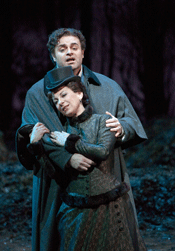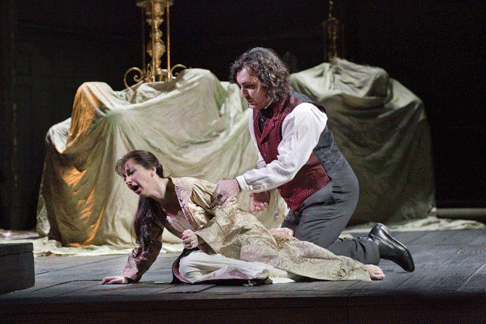15 Mar 2011
Lucia, New York
It costs a lot to look cheap. And it takes a village to raise a child. In the case of the Metropolitan Opera’s current revival of Donizetti’s Lucia di Lammermoor, it takes a lot of talent to produce underwhelming opera.

It costs a lot to look cheap. And it takes a village to raise a child. In the case of the Metropolitan Opera’s current revival of Donizetti’s Lucia di Lammermoor, it takes a lot of talent to produce underwhelming opera.
Despite what anyone says regarding soprano Natalie Dessay’s vocal technique or her attendance record at the Met, she is undoubtedly an exciting performer to watch. Joseph Calleja and Ludovic Tézier both bring ample good looks and stage worthiness to the table in addition to fine musicianship and distinctive voices. Director Mary Zimmerman, a 1998 recipient of a MacArthur “Genius” grant, took the theatre world by storm with her 2002 adaptation of Ovid’s Metamorphoses. So, why is this Lucia so bland?
 Joseph Calleja as Edgardo and Natalie Dessay as Lucia
Joseph Calleja as Edgardo and Natalie Dessay as Lucia
From the moment the curtain raises, it appears that the devil is in the details. The overture is a semi-staged affair with depressingly literal lighting effects and, when the action begins, the extremely tight false proscenium looks more like a diorama from the Museum of Natural History than a set from one of the world’s leading opera houses. During the interlude after the first scene, snow falls for no apparent reason other than to justify the large muff that Lucia wields later.
But these are relatively small concerns compared to the generic performances that Zimmerman elicits from her starry cast. Dessay, a stage animal par excellence, even seemed tentative in the first and second acts. Perhaps this was partially due to the limitations placed upon Lucia’s psychological development by making the ghost literally appear during “Regnava nel silenzio.” If Lucia is not unhinged by grief at the beginning, her affection for Edgardo falls short of passion, and the situation with her brother is only vaguely threatening in the second act, then there is little justification for her later actions.
Furthermore, in this production, Lucia appears with her bridegroom at the beginning of Act III, Scene ii and they exit the stage only moments before Raimondo enters and tells the wedding guests what has transpired in the bridal chamber. This robs the audience of seeing Lucia’s shocking transformation from obedient bride and sister into a madwoman. Even worse, the timing is completely off — the horror of the moment stems as much from the realization that the party has gone on for hours as Arturo’s body grew cold as in Lucia’s act itself. There were several such lapses in the storytelling and Zimmerman seems to have stayed too close to the original novel and done the opera a disservice by not treating it as the ripping tale it is.
 Ludovic Tézier as Enrico and Natalie Dessay as Lucia
Ludovic Tézier as Enrico and Natalie Dessay as Lucia
Within the murky and misguided production, the singers did their level best. Dessay rallied for her mad scene which transfixed the audience. Ludovic Tézier looked and sounded the part of Lucia’s brother Enrico, burdened as he was with a costume that made him Severus Snape’s doppelgänger. And while tenor Joseph Calleja was impassioned as Edgardo, unfortunately the tension between the two characters during the Wolf’s Crag scene was nonexistent due to some serious park and bark staging in front of a silly-looking scrim with a mouse hole. Kwangchul Youn was absolute luxury casting in the role of Raimondo and Matthew Plenk handled his duties as Arturo so well that it seemed a real pity to see him go so quickly.
The chorus was well-rehearsed musically but did little to convey the social turmoil that provides the impetus for the action and ultimately serves as a Greek chorus during the opera’s greatest moments of catharsis. Conductor Patrick Summers lead the reliably excellent orchestra with suavity and confidence.
With all the elements in place behind this production — including great source material, a fantastic cast, and the technical and artistic resources of the Metropolitan Opera — the results felt like a waste, much like the blighted life of the opera’s heroine.
Alison Moritz